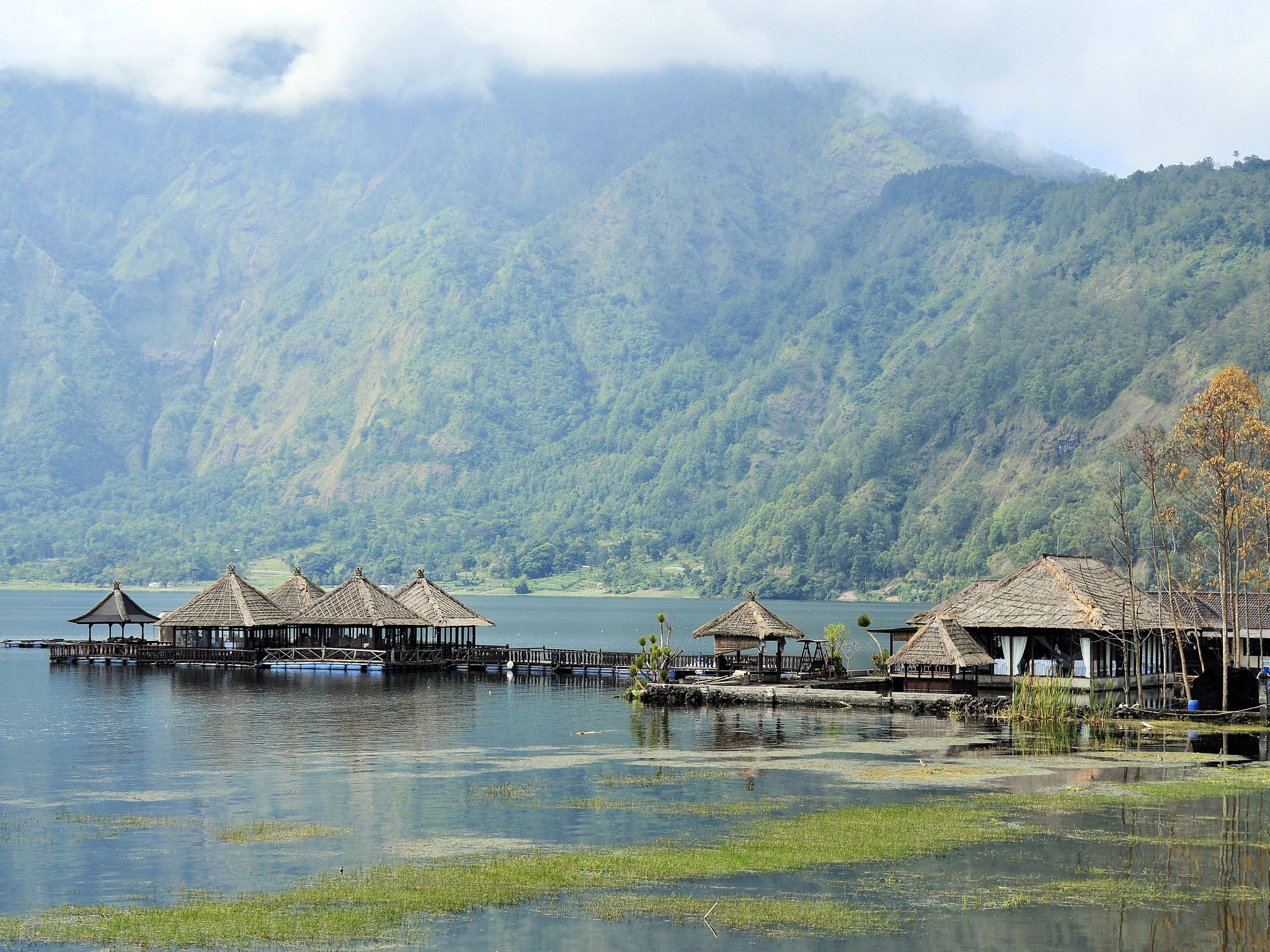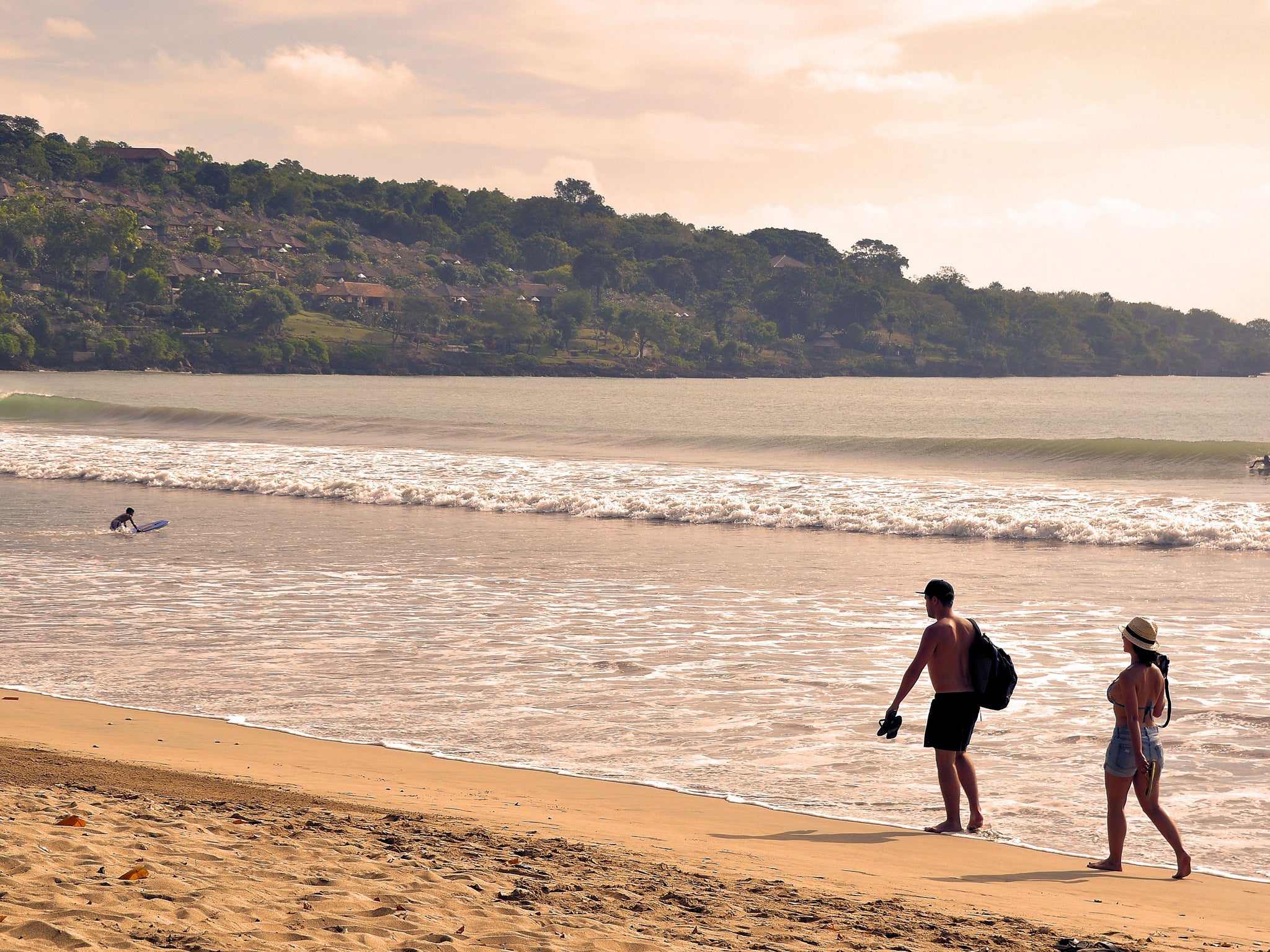The Independent's journalism is supported by our readers. When you purchase through links on our site, we may earn commission.
Bali: Beach breaks, jungle treks and wildlife watching
The Balinese believe heaven looks much like their island, and they could well be right

Your support helps us to tell the story
From reproductive rights to climate change to Big Tech, The Independent is on the ground when the story is developing. Whether it's investigating the financials of Elon Musk's pro-Trump PAC or producing our latest documentary, 'The A Word', which shines a light on the American women fighting for reproductive rights, we know how important it is to parse out the facts from the messaging.
At such a critical moment in US history, we need reporters on the ground. Your donation allows us to keep sending journalists to speak to both sides of the story.
The Independent is trusted by Americans across the entire political spectrum. And unlike many other quality news outlets, we choose not to lock Americans out of our reporting and analysis with paywalls. We believe quality journalism should be available to everyone, paid for by those who can afford it.
Your support makes all the difference.The haunting refrain of a temple prayer call echoes through the coconut palms as a tropical sun burnishes the rim of a towering volcano. Women clad in vibrant sarongs and kebaya blouses hurry along the street with offerings perched high on their heads.
Bali has long been renowned for its uniquely colourful culture. Unusual among the world’s island dwellers, the Balinese traditionally turned their backs on the sea, choosing instead to look upwards, towards the peaks of their sacred mountains. The sea was considered to be unclean and unholy, so that even the fishermen chose to build their homes safely inland. Because of this the first tourists to arrive discovered a paradise where endless beachfront land was available, and very cheap.
For many modern visitors, a holiday on the island still revolves around glorious beaches. It is rare to find a holidaymaker, however, who is not also keen to travel beyond the beaches to experience day-to-day life on Indonesia’s only majority Hindu island.

The cascading valleys and terraced paddy fields around Ubud are Bali’s cultural heartlands. Ubud became a haven for European artists, writers and vagabond bohemians who were lured by a picture-perfect landscape, vibrant ceremonies and unspoiled rural life back in the 1930s. These days countless bules (foreigners) come to live the Bali dream in a karmic boomtown that has become one of the world’s capitals for yoga and healthy living.
When Made Gunarta co-founded the Yoga Barn (00 62 3619 71407; theyogabarn.com) in 2006 it was the only venue in Ubud built specifically for yoga. Now Made’s hometown boasts dozens of retreats and hosts the Bali Spirit Festival (00 62 3619 70992; balispiritfestival.com) every April.
“They say that the name Ubud came from an old Balinese word meaning ‘place of healing’,” Made says, “That’s really what Ubud has always been.”
Indonesia is the world’s biggest island nation, with an estimated 13,465 islands. Bali, which has a total area smaller than Devon, is the most popular among tourists, although many of the outlying rural regions and wilderness areas of this incredibly diverse island are often overlooked by visitors.
Reaching Bali from the UK has always required at least one change of planes, but this summer Emirates (0344 800 2777; emirates.com) added a new one-stop option, connecting six UK airports to the island, via Dubai – Heathrow, Gatwick, Manchester, Birmingham, Glasgow and Newcastle.
Cox & Kings (0207 873 5000; coxandkings.co.uk) offers a 14-day private tour combining the best of Bali & Java, priced from £2,595 per person including flights, transfers and excursions, B&B and some other meals.
Asia specialist Backyard Travel (00 800 22259273; backyardtravel.com) has an action-packed 10-day guided tour around Bali, with half-board accommodation, starting at £469 per person, excluding flights. And Intrepid Travel (0808 274 5111; intrepidtravel.com) offers a nine-day Beautiful Bali trip starting from £585 per person, including accommodation, some meals, transport and a local guide. Flights are extra.
The Balinese believe that when they die, heaven will look very much like their island. Take time to explore beyond the usual tourist trail and you’re sure to come to the conclusion that they’re very probably right.
Central Bali
Ubud, spiritual heartland of the island of the gods, is a popular day trip. It lies across a range of dramatic jungle valleys and paddy fields, but even its bustling town-centre captivates visitors. Bali to Bali Tours (00 62 812 395 6828; balitobali.com) runs a range of customised day trips such as a cultural visit to Ubud that takes in the Monkey Forest, Ubud Palace, Taman Ayun (Royal Temple) and sunset at Tanah Lot. From 450,000 rupiahs (£21) for up to three people, with an English-speaking driver/guide.
Soul-searchers also flock here on Eat, Pray Love-style yoga and health escapes. Among the numerous high-end properties offering detox retreats and treatments are Fivelements Resort (00 62 3614 69260; fivelements.org); Four Seasons Resort Bali at Sayan, and Mandapa, a Ritz-Carlton Reserve (see “Where to stay”, overleaf, for more on the latter two).
In recent years the dramatic landscape around Ubud has also attracted adrenalin junkies with everything from rafting to cycling, trekking, quad-biking and horse riding. Ayung River Rafting (00 62 851 01 506060; ayungriverrafting.net) is a local outfit offering numerous adventurous activies. Basic rafting packages start at US$39pp (£26) for a minimum of two people taking part.
South coast
Once considered the desert badlands, the relatively dry peninsula south of the airport is now Bali’s premier haven for sun-worshippers. Nusa Dua is where many of the island’s most exclusive resorts are. Visitors are able to get their culture fix with sunset trips to the breathtakingly beautiful Uluwatu cliff-top temple. The great stretch of beach at Jimbaran has its own share of prestigious properties and is perfectly placed for the airport and for trips to the Bukit Peninsula and mainland.

In recent decades the backpacker and budget traveller zone of Kuta has sprawled up the coast into Legian. Further west, Seminyak and Canggu now offer hundreds of designer villas and stylish retreats at very competitive prices, such as IZE Seminyak (00 62 36184 66999; ize-seminyak.com) which has rooms starting at just US$85 (£57), room only. All of these areas access world-class beaches, and even much-maligned palm-fringed Kuta (right) surprises visitors used to the high-rise concrete jungles of the Med.
Uluwatu is famed for one of the best waves on our planet, there are world-class surf-spots on Bukit (Belangan, Padang Padang, Balangan, Green Bowl) and on the main island itself (Kuta Reef, Legian, Canggu, Keramas, Medewi). Bali Surf Tours (00 62 8123815180; balisurftours.com) can arrange day trips or multi-day “surfaris” anywhere on the island from US$65 (£42)pp. Surfboard rental is an extra US$10 (£6.40), and accompanying non-surfers can tag along for US$10 (£6.40)pp.
Nusa dua beach, Bali Wild west
Bali’s “wild west” is blessed with mile upon mile of deserted volcanic black sand beaches, jungles, paddies and a timeless island lifestyle that, even today, is rarely seen by outsiders.
West Bali National Park, which covers most of the western end of the island, remains a mystery even to many native islanders. It is almost inconceivable that an area of virtually unexplored jungle, half the size of the Isle of Wight, could lie just a three-hour drive from Bali’s international airport. Even more surprising is the fact that it is home to some of the most prolific wildlife in South-east Asia, including four types of deer, two species of monkey and countless birds such as hornbills and the extremely rare Bali starling (right).

There’s virtually no tourism infrastructure in the park but Puri Dajuma Beach Eco-resort (00 62 811 388709; dajuma.com), near Medewi, can arrange customised treks, and even camping expeditions. The resort has lovely beachfront bungalows from US$228 (£152) a night, room only.
Medewi surf point is Bali’s longest wave and this little beach strip is gaining a reputation as a quiet and restful retreat for surfers – and, increasingly, yoga aficionados – people who crave something more fulfilling than their regular hangouts around Kuta and Ubud.
North Coast
While surfers gather along the south coast, Bali’s north shore is paradise for divers (right). Amed lies in unexpectedly arid cactus-country in the rain-shadow at the foot of Agung volcano. But the crystalline clarity of its waters guarantees world-class reef and wreck dives.
There are several respected dive schools here including Ecodive Bali (00 62 363 23482; ecodivebali.com) and even a free-diving and yoga centre, Apnea Bali (00 62 822661 25814; apneabali.com), where you can learn to dive unencumbered with breathing apparatus.

Countless visitors set out every morning from the fishing town of Lovina in jukung outriggers, keen to catch sight of leaping pods of up to 100 dolphins, but Menjangan Island is often described as Bali’s dive-spot par excellence. The Menjangan resort (00 62 362 94700; themenjangan.com) offers dive tours around the island from US$145pp (£97), a price that includes equipment hire and guides.
Budget diving day trips can cost as little as 500,000 Indonesian rupiahs (£24) if you ask around the dive-shops in Pemuteran village (near the jetty from where boats depart for Menjangan).
Where to stay
Balinese-style architecture has been exported all over the world, with resorts combining stylish indoor areas with suitably tropical and sumptuous outdoor lounges. Simple bungalows (typically with a private hot-water bathroom and terrace) can be had in most parts of the island – ritzy areas such as Nusa Dua and Seminyak excepted – from about IDR150,000 (£7), B&B.
At the higher end of the spectrum, Mandapa, a Ritz-Carlton Reserve (pictured above; 00 62 361 479 2777; ritzcarlton.com) near Ubud starts offering bespoke health and wellness programmes this month. Doubles start at US$484 (£323), including breakfast and a 24-hour butler service.
The Chedi Club Jimbaran (00 62 361 704435; ghmhotels.com) is another new five-star arrival, drawing on traditional tropical chic through the work of Australian architect Robert Nation and interior designer Jaya Ibrahim. Doubles from US$469 (£313), B&B.
The new Four Seasons Resort Bali at Sayan (00 62 361 977577; fourseasons.com) has 18 suites and 42 villas in a rainforest near Ubud. Doubles from US$490 (£326), B&B. And the Westin Resort Nusa Dua (00 62 361 771906; westinnusaduabali.com) has had a complete refurb. Doubles from US$315 (£210), B&B.
Travel Essentials
Getting there
There are no direct flights from the UK to Bali. Emirates (0344 800 2777; emirates.com), Qatar Airways (0844 846 8380; qatarairways.com), KLM (00 31 20 6499123; klm.com), Etihad (0345 6081225; etihad.com), Singapore Airlines (0844 800 2380; singaporeair.com) and Turkish Airlines (00 90 850 333 0 849; turkishairlines.com) offer one-stop services.
Getting around
A previous gripe for visitors who wanted truly to experience the island was the traffic jams around the southern beach areas, but a new highway means a far smoother connection from the airport and hotels to the rest of the island, ensuring tours and sightseeing are increasingly hassle-free.
While most of the major international car hire firms are represented in Bali, it can be far more cost-effective to rent with a local company. About 200,000 rupiahs a day (£9) could be enough for a seven-seater minibus or 100,000 rupiahs (£5) for a 4x4. Driver/guides can be hired for an extra 100,000 (£5) but you should also budget for this person’s accommodation and meals.
Travel warnings
The Foreign Office advises visitors to be particularly vigilant about terrorist attacks during holiday periods: Independence Day (17 August), Easter, Christmas, New Year and Nyepi (Balinese New Year, 21 March).
Join our commenting forum
Join thought-provoking conversations, follow other Independent readers and see their replies
Comments